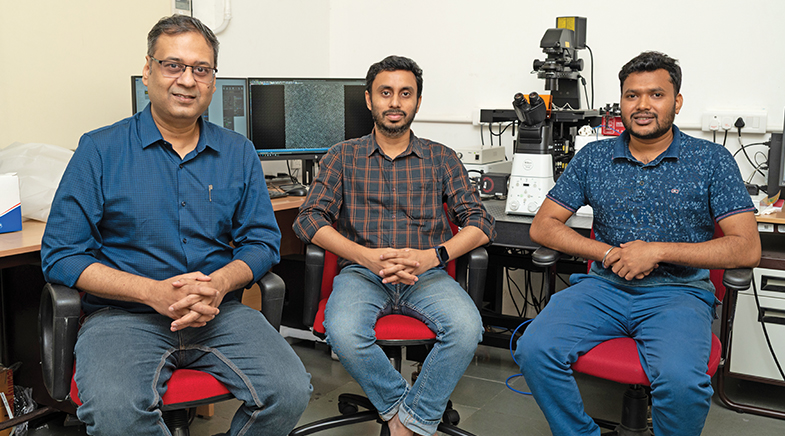Kick that habit
-
- from Shaastra :: vol 04 issue 01 :: Feb 2025

At home and at work, 'good habits' can be cultivated – with a little help from behavioural change agents.
Ponnurangam Kumaraguru has been exploring social media tools for the last 15 years — not for leisure, though, but for work. The Professor of Computer Science at the International Institute of Information Technology (IIIT), Hyderabad, treats platforms such as Reddit, Snapchat and X as sources of large-scale datasets on human behaviour. He is trying to see if social behaviour studied for decades exists on such platforms. "That's been the theme of our work," he says.
Simultaneous commitments also promote habit continuity. Instead of pursuing a single habit goal, some users pursued more than one goal at the same time.
Kumaraguru's interest was piqued when two Yale professors who wanted to lose weight launched the online platform stickK in early 2008. stickK uses insights from behavioural science research to help people develop desired habits and shed the ones they want to discard. Kumaraguru partnered with his then PhD student Hitkul Jangra, analysing the data from the platform. Much of the analysis was published in a 2024 study (bit.ly/habit-behaviour). Working with a large dataset of more than 700,000 stickK users and close to 400,000 habit goals, Kumaraguru and Jangra attempted to tease out the factors that promoted success in habit-building.
BIG DAYS, BIG STAKES
The start of a new year symbolises hope. This is the time when people tend to set habit goals: quit tobacco, exercise more, eat healthy food, acquire a skill, and so on. Kumaraguru and his colleagues wanted to see if temporal landmarks or significant dates, such as New Year's Day, the start of a week, or perhaps a birthday, affected the success of habit formation. However, the data showed that although many people liked to start new habit goals on temporal landmarks, the dates did not impact the success rate of habit formation.
On the other hand, he says, involving "an external referee" and "assigning a monetary stake to commitments" were strong predictors of success. "(But) these features/methods are underutilised by users," Kumaraguru adds. The association with habit formation is nuanced when it comes to monetary stakes. While more money at stake leads to better results, the type of stake and who benefits from the pot also impact success. Users could pre-identify the beneficiaries: it could be a charity of their choice, a friend – or even an "anti-charity organisation" that a user was strongly opposed to. (By designating an "anti-charity" as a beneficiary, the user may work harder on the commitment in order to ensure that the money at stake does not fall into the "wrong hands".)
The study found stakes meant for anti-charity bodies promoted greater success at habit-building compared to stakes directed to preferred charities or friends. The data showed that only 29% of habit goals had a monetary stake attached to them. And anti-charity was the most common stake type. The prospect of losing money to an unworthy or undeserving cause appears to motivate users.
Another factor that promotes habit continuity is the power of simultaneous commitments. Instead of pursuing a single habit goal, some users pursued more than one goal at the same time. Nearly 41% of goals were clubbed with another proposed habit. "While this approach may lead to early failures, those who persist beyond the initial phase tend to achieve higher success rates compared to those focusing on a single habit," Kumaraguru says. Although the researchers don't delve into why this happens, they identify it as an area for further exploration. "What kind of commitments are often linked together? Are certain combinations more favourable than others," he asks.
HABITS IN THE WORKPLACE
Most people tend to look at habit-building in their personal life. But there's much to be gained from building better workplace habits, too. "We spend about eight hours at work every day. It's literally a third of the day. A place where people spend so much time of their lives should be a place where people can grow," says Krishna Prasaad, Founder of Aspire, a Chennai-based start-up that uses habit formation as a tool to improve employee performance and company growth.
Aspire's flagship product is a SaaS-based digital tool that supports habit formation. It works with organisations to identify lacunae in their typical workflow and the habits that employees should cultivate to tide over problem areas. The habits identified depend largely on the organisation concerned and its requirements. Once these habits are rolled out to employees, Aspire's digital tool provides cues and rewards to keep employees on track. The tool is built keeping in mind the behavioural science principles that encourage habit formation such as accountability and reward for positive action. Accountability comes from the community, the group of people trying to adopt the same habits. Nudges from supervisors and managers build another layer of accountability.

For the reward aspect, the app has a scoreboard that helps people understand where they stand in their community. "People can share a growth card from the app where they can brag about their consistency and their points to the world," says Prasaad. After being consistent for some time and accumulating a certain number of reward points, employees can get "real aspirational rewards for their habits". For example, he says, an employee who has been successful for three months may get a Netflix subscription.
Most people tend to look at habit-building in their personal life. But there's much to be gained from building better workplace habits, too.
According to the Aspire website, the start-up has worked with more than 30 organisations to help their employees build better habits. Prasaad thinks the tool is especially useful for those in sales and customer-facing roles, or those working as team leaders or managers. He cites the example of a pharmacy chain in Maharashtra. Aspire worked with more than 200 employees there to help them cultivate positive customer experience habits. By instilling these habits, they eventually saw an increase in the organisation's Net Promoter Score — a measure of customer satisfaction and loyalty. In another example, Aspire worked with a manufacturing unit in a Tier-III town in Tamil Nadu. The company's employees had to cultivate habits for reporting quality checks on machines, which led to increased efficiency. Cultivating appropriate habits is a great way to enable growth, he says, as "everybody can understand the concept of habits".
MENTAL ASSOCIATION
Habits affect nearly every area of one's life – from physical and mental health to relationships and work. In his 2012 book, The Power of Habit, Charles Duhigg tells the story of Eugene Pauly, who lost his ability to form short-term memory but continued to perform routine tasks relying on ingrained habits. Habits kept him going even when his brain had let him down.
Little wonder, then, that researchers across domains — from psychology to artificial intelligence – are studying habits to figure out the mechanisms that help a person acquire or shed habits.
Habits are a mental association between a situation and an action that is created when the action is repeated in that particular situation, says Phillippa Lally, Senior Lecturer in Psychology at the University of Surrey, U.K. Once the link is formed, the situation triggers the action. "We are still just trying to work on finding ways to support people to repeat behaviours in the same situations," says Lally. "The key is choosing behaviours you enjoy or making ones you don't enjoy more enjoyable."
See also:
Have a
story idea?
Tell us.
Do you have a recent research paper or an idea for a science/technology-themed article that you'd like to tell us about?
GET IN TOUCH














